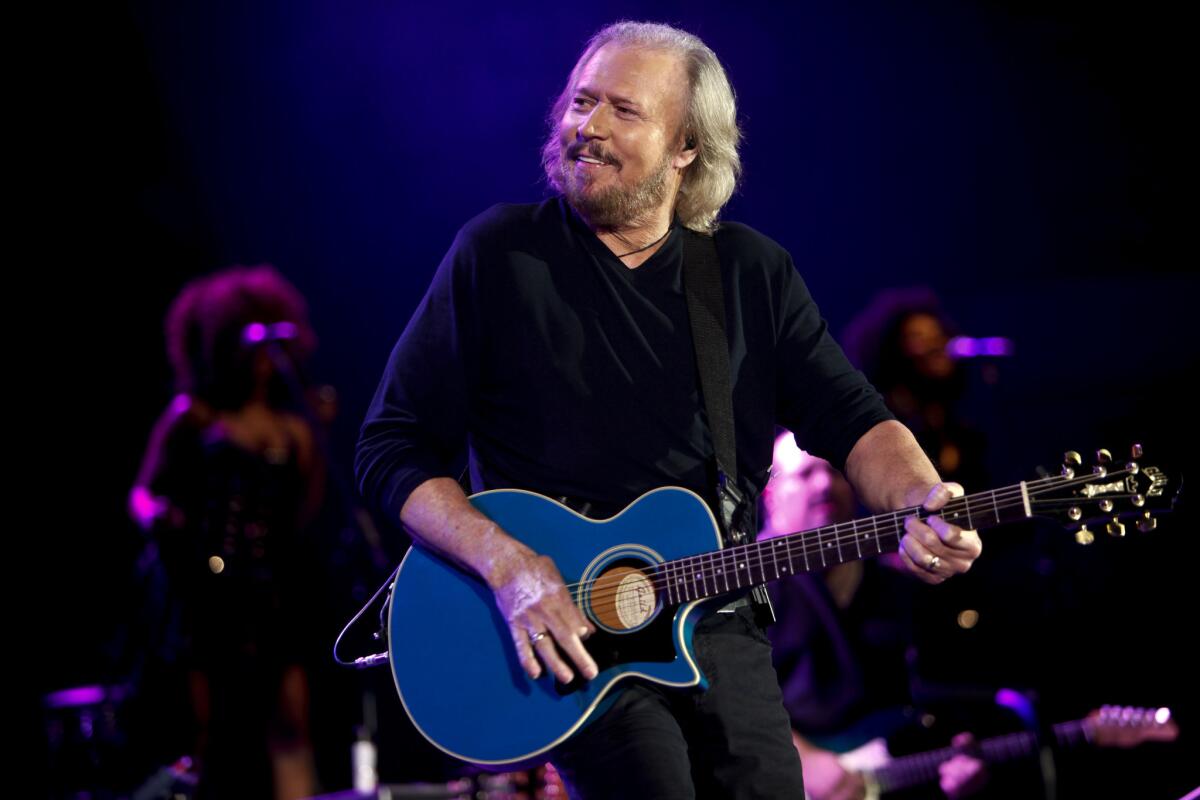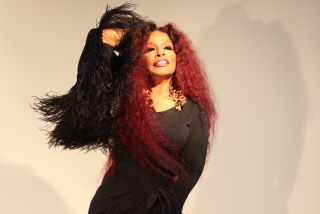Review: Barry Gibb: A broken heart mended at the Hollywood Bowl

- Share via
Does anyone wear his legend status as lightly as Barry Gibb?
On Wednesday night, the Bee Gees frontman hit the Hollywood Bowl for the final stop of his Mythology Tour, a brief run of solo concerts designed to showcase the breadth (and depth) of the music he made with his late brothers, Robin and Maurice.
But if the succession of undeniable songs demonstrated Gibb’s huge effect on pop -- we’re talking “To Love Somebody,” “How Deep Is Your Love” and, of course, the immortal “Stayin’ Alive” here -- he wasn’t making a big deal about it.
“The last of six,” he said by way of introduction, referring with an easy chuckle to the number of his U.S. tour dates. “Then I go watch television.”
The lightness of Gibb’s manner was especially remarkable given the heavy toll evidently taken by his brothers’ deaths. (Maurice died in 2003, Robin in 2012; a third brother, Andy, died in 1988.)
“When suddenly you’re on your own after all those years,” he said in a recent Rolling Stone profile, “you start to question life itself. What’s the point in any of it?”
Memories of his siblings coursed through the 2½-hour show in the form of photographs and videos; Robin appeared on a large screen above the stage to sing “I Started a Joke.” Other Gibb family members took part, as well, including Maurice’s daughter Samantha, who harmonized with Barry in “How Can You Mend a Broken Heart,” and Barry’s son Stephen, who played guitar in the 11-piece band.
Gibb even admitted that his daughter Ali was on the road operating his teleprompter.
Rather than weigh him down, though, these reminders seemed to buoy Gibb, an infrequent performer these days. They added to the sense that Wednesday’s show was more or less an extended jam session that might’ve broken out anywhere.
Nor was he slowed by the freight the Bee Gees’ music has taken on since the trio’s disco-era heyday -- the caricaturization of their hairstyles and clothing and the knee-jerk associations with show-business excess.
At the Bowl, “Jive Talkin’ ” and “Night Fever” sounded as lithe and as effervescent as ever with Gibb’s aerated falsetto skipping over grooves that still suggest a kind of perpetual motion. Even “Stayin’ Alive,” with four guitarists urging the music ever forward, felt unburdened by history.
Perhaps that’s because so much current pop looks back to what the Bee Gees were doing in the late 1970s. Daft Punk’s “Get Lucky,” Pharrell’s “Happy,” “Take Back the Night” by Justin Timberlake (who has portrayed Robin Gibb in a recurring sketch on “Saturday Night Live”) -- even now these songs run a serious Saturday night fever.
Here again, though, Barry Gibb wasn’t seizing an opportunity in the manner of a more calculating veteran. He hardly seemed driven by the desire to reach new listeners, which is probably why he spent a sizable portion of his set on lesser-known songs such as the gently psychedelic “Spicks and Specks,” one of the Bee Gees’ earliest singles. (He also did hits from the group’s pre-disco period including “I’ve Gotta Get a Message to You” and “To Love Somebody.”)
The show had its saggy moments. An overblown rendition of “Guilty,” Gibb’s supple 1980 duet with Barbra Streisand, sacrificed the record’s pillow-talk delicacy. And though it clearly meant a great deal to Gibb, Robin’s video appearance actually felt slightly ghoulish.
But right when you’d expect him to bog down -- in a cover of “I’m on Fire” by Bruce Springsteen, who Gibb said had done “Stayin’ Alive” at a recent tour stop in Australia -- he maintained the sense of weightlessness that distinguished Wednesday’s performance.
Restraining his voice to a breathy flicker as his band murmured behind him, Gibb sang more quietly than he had sung anything else all night, barely touching the melody, as though he were frightened of its intensity or what it might evoke.
It was beautiful and spooky and just the slightest bit sad -- amazing, really. And it was over before you knew it.
More to Read
The biggest entertainment stories
Get our big stories about Hollywood, film, television, music, arts, culture and more right in your inbox as soon as they publish.
You may occasionally receive promotional content from the Los Angeles Times.










